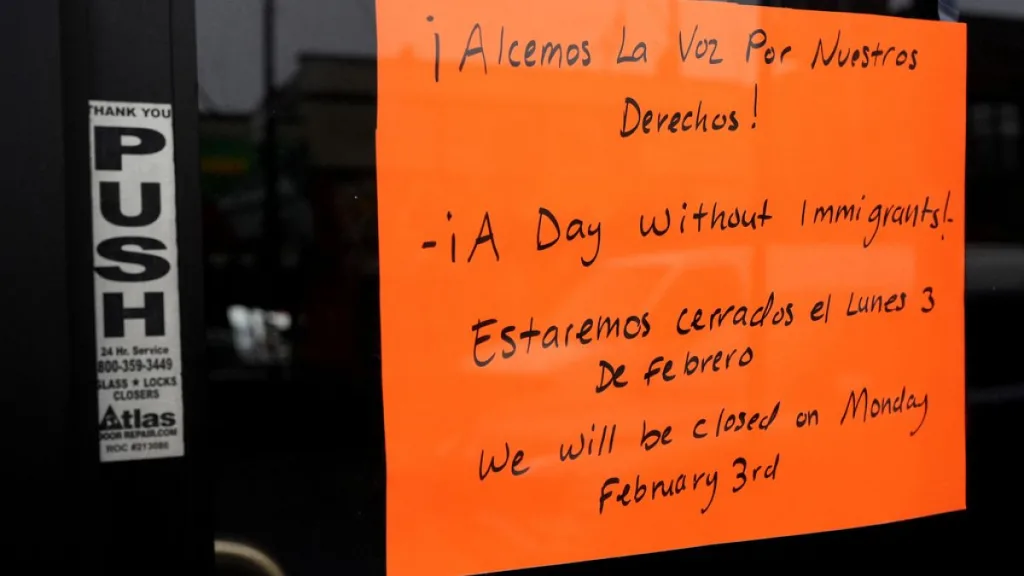On Monday, various businesses across the United States—including daycares, grocery stores, and hair salons—closed their doors in a loosely organized protest against President Donald Trump’s immigration policies. This event aimed to highlight the crucial role that immigrant workers play in their communities.
Participation in the “Day Without Immigrants” faced challenges as many workers and business owners cited financial necessity. As fears of deportation loomed, stemming from rumors of immigration raids—some unfounded—many migrants felt unsafe venturing out. This sentiment was echoed in schools, where attendance was affected. The protest followed a series of demonstrations in California and other regions on the preceding Sunday.
Noel Xavier, the organizing director for the North Atlantic States Regional Council of Carpenters, emphasized that while it’s vital to showcase the contributions of migrant workers, many cannot afford to miss a day of work. “If I don’t go to work today, that means less money for my next rent payment,” Xavier remarked, reflecting the reality many workers face. “There wasn’t a significant rallying cry to support those who couldn’t take the day off.”
Jaime di Paulo, president of the Illinois Hispanic Chamber of Commerce, noted that while several small restaurants and retailers in Chicago’s predominantly Latino neighborhoods shut down for the day, larger employers, particularly in construction, continued to operate as usual. “This could end up hurting our community,” he warned.
Hair salon owner Andrea Toro decided to join the protest by closing her salon in Chicago’s Pilsen neighborhood. Many of her clients, who are educators, have reported that children have been absent from school out of fear since Trump took office. In cities like Chicago and San Diego, school districts observed significant participation in Monday’s protest, with families pulling their children from classes.
“Without immigrants, there’s nothing happening around here,” Toro stated, articulating the fears surrounding silence in the face of these policies. “If we remain mute, they will have the power to dictate our reality.”
El Burrito Mercado, which evolved from a small Latino market in the 1970s into a well-known restaurant and grocery in St. Paul, Minnesota, opted to close fully during a similar event in 2017. However, on Monday, the establishment opened with limited staff, as co-owner Milissa Silva explained that many employees were apprehensive about losing a day’s pay and wanted to maintain grocery access for their neighborhood.
Similarly, Tierra Encantada, a Spanish-language immersion daycare, chose to keep its 14 locations operational. Nonetheless, many parents kept their children home in solidarity with the immigrant workforce. CEO Kristen Denzer reported that 450 children, representing about 70% of enrolled students in Minnesota, did not attend daycare on this day. A number of staff who were previously undecided chose to join the protest after seeing the community support.
In Utah, multiple Latino-owned businesses, including stores, restaurants, and supermarkets, opted to close as well. State Senator Luz Escamilla, a Democrat and Senate minority leader, described the movement as one focused on compassion and community awareness about the climate of fear surrounding immigration.
Responding to inquiries about the protest during a media event, Utah Senate President Stuart Adams defended Trump’s immigration policies, asserting that law-abiding immigrants should not have anything to fear. “The only individuals facing deportation are those with criminal records or who have committed serious offenses,” Adams stated.
Despite ongoing immigration enforcement targeting individuals considered threats to public safety and national security, the current administration’s practices have shifted. Officers can now arrest undocumented individuals encountered during routine operations, a significant departure from previous approaches under the Biden administration.
Photo credit & article inspired by: Euronews



